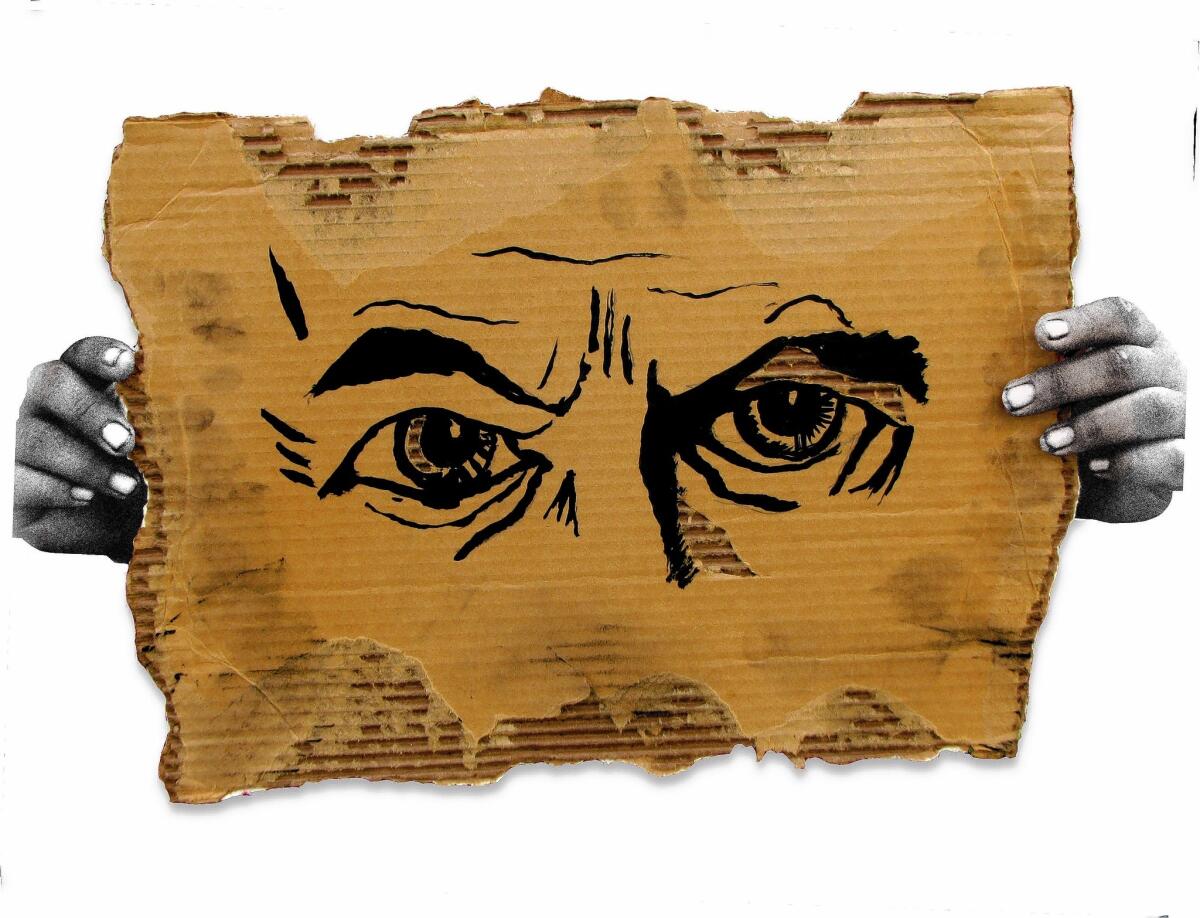Have you seen my brother standing in the shadows?

My brother John called me last summer to tell me that he had finally figured out our family secret. I was his mother, he said.
I am not, of course.
My brother is 38 years old, but I will always think of him as he was in his early 20s, when he was diagnosed with schizophrenia. His good looks landed him work as a model, and he was a math whiz.
Today, he is still attractive and wickedly smart at times, but his skin is weathered from years of homelessness and he is missing half of a finger on his right hand from one of his “stays” in a county jail. He is unmistakably homeless but still charming enough to persuade passersby to give him clothes or a beer, or to play a game of pool.
His homelessness always starts with stopping his medication. Eventually he gets into trouble, usually from self-medicating with alcohol, and bounces from incarceration to forced hospitalization. It has happened over and over. He spent Thanksgiving locked up in Twin Towers for stealing a $4 strawberry Budweiser.
His latest round of homelessness began last spring after his landlord lost his apartment building to foreclosure and all of the tenants were evicted.
John had stopped taking his medication a few weeks before he lost his home, blaming the fact that yet another Valentine’s Day had passed without someone to share his life. Since then he hasn’t accepted offers of help because he has stopped thinking rationally.
Not being able to help him is immensely frustrating. In my professional life, I have worked to build housing and create programs to end homelessness. But the system is broken, especially for homeless people with severe mental illness, like my brother. My family and I just keep hitting dead ends trying to get him help.
It’s not that money isn’t being spent on him. Study after study from across the country has demonstrated that the cost of dealing with people like my brother, who ricochet from the streets to hospitals and jails and back, is exorbitant. I estimate that, in the last year, the federal government, several counties, the state and local communities have spent more than $1 million on John.
And all of us — taxpayers, my family and John — are getting nothing for that money. The government could have bought him a cute single-family home in Pasadena with a full-time social worker and spent less.
My older brother Steve has tried to get appointed as John’s conservator, but each time the matter has come before the court, John has convinced a judge that he is capable of managing his own affairs. John passes his days in conversation with imaginary people, but he is still capable of repeating a few memorized sentences that a judge accepts as proof he can care for himself.
For weeks at a time, he goes missing. Then he turns up in an emergency room, police station or hospital. He’s been picked up for throwing himself at cars or belligerently talking to himself. He spent July in a hospital where he imagined that family members were with him. The hospital released him to a board-and-care facility, claiming he’d been stabilized, but he stayed only briefly before leaving.
In September, a friend found John asleep at my house. I called an outreach worker from Housing Works to try to get him help. They came and worked out a plan with John for housing and healthcare, but he changed his mind later in the day, walking away from the social worker, back into homelessness.
I found him again but couldn’t persuade him to accept help. He says that I don’t understand his profound loneliness and that my “options” are not what he wants. His appearance has deteriorated. He is thinner and his skin is blistered from sun and cold. I tried to feed him, but he wasn’t able to sit still long enough to eat much.
A few days later, he was forcibly hospitalized for a couple of weeks but wouldn’t allow the social workers to contact me. I again lost track of him until I checked the police records on his birthday, Nov. 13, and found out he was in jail.
There are programs that work to interrupt this kind of cycle, but there are far too few of them, serving far too few people. As a result, stories like my brother’s are not unique.
I know from my professional experience that progress has been made to end homelessness. But I have also seen firsthand the overwhelming failures in parts of the system. Discharge plans after imprisonment or hospitalization are required, but they are rarely useful. And gaining access to programs that work remains extremely difficult. For most of the chronically homeless mentally ill, we waste large sums of money on ineffective interventions.
My family and I live in dread that one day we will get “the call” informing us that John has lost his life. But my brother never gives up hope that he will find a girl/job/apartment.
We had breakfast together recently.
He had been released from jail the night before and walked through the night to Pasadena. He called at 6 a.m., and I went to meet him.
We made big plans about getting him a place to live and connecting him with services. I left him at a barbershop about to open because he wanted to get cleaned up. I went back after dropping the kids off at school, thinking things might get better. But by the time I returned, he was gone.
For the next few days, I drove around with a full duffel bag of clothes and supplies looking for my brother. I found him eventually. His medication had been stolen and he was holding on to a brick wall, talking to himself, on Colorado Boulevard.
Sarah Dusseault was a senior policy advisor to Eric Garcetti when he served on the City Council. She was deputy mayor for housing and homelessness in the administration of Mayor James Hahn.
More to Read
A cure for the common opinion
Get thought-provoking perspectives with our weekly newsletter.
You may occasionally receive promotional content from the Los Angeles Times.










